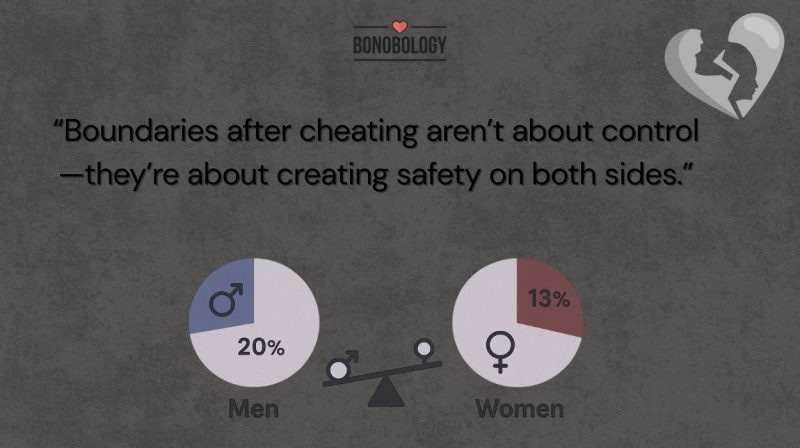When we speak of infidelity, it’s usually in the context of a partner getting sexually or emotionally involved with another person. But did you know financial infidelity can also be a major issue among couples? One that can not only destabilize your relationship but also send your entire life crumbling.
But what exactly qualifies as financial infidelity? What are the consequences of financial secrecy in relationships? Why does it happen? How can you spot it? We address these questions to help you safeguard your relationship from falling prey to this tendency and your life from financial ruin. To understand the intricacies of financial infidelity, we spoke to Joie Bose (author and co-founder of the Poetry Paradigm and an executive body member of Indian Performance and Poetry Library).
What Is Financial Infidelity?
Table of Contents
Financial infidelity is when one partner starts hiding financial information and monetary transactions from the other. This could include anything from undisclosed spending to using savings without telling one’s partner, mounting credit card bills, or losing money to addictive habits such as gambling.
Even in its mildest form, secrets about money can strain the relationship. As the severity of the financial secrecy in relationships grows, it can prove detrimental to a couple’s future together. In marriages, an inability to overcome financial differences can lead to divorce.
According to a National Endowment for Financial Education study, two out of five adults in the US admit to having committed financial infidelity in their relationships. Another study finds that these differences are the reason behind 30 percent of all divorce cases in the US.
While marriages are more susceptible to this risk since spouses tend to merge or share their finances, it can also impact people in long-term committed relationships. Particularly in cases where both partners are living together or maintaining joint savings for a specific shared goal such as marriage, buying a house, or a dream vacation.
Related Reading: Achieving Financial Harmony As A Couple
What Counts As Financial Infidelity?
Our expert Joie Bose says, “When you are married, every dynamic of the relationship changes — especially when it comes to finances. If you are married and you die tomorrow, all your money will go to your partner. They will also inherit your bills and your debts.
This means that you are financially responsible for each other. If you are still making extravagant purchases and taking out debts, putting the family in jeopardy, you are basically disrespecting your partner and the relationship. Maybe you, as a husband, have an unconscious bias where you feel your wife won’t understand the decision. That means you don’t treat your partner as your equal. You want to stay financially superior and that there is a lack of mutual respect in the relationship.”
Marriage is all about teamwork. Unlike in the case of a dating — no matter how serious the relationship — your decisions will almost always affect your partner and their well-being. So, while financial infidelity may sound like it cannot be as bad as physical or emotional infidelity, it can still have devastating effects on people’s marriages.
One bad financial decision, one extravagant gift or a trip that you do not tell your partner about, can be the first step towards being financially infidel towards them. Obviously this does not mean that you are not allowed to spend on or do things you enjoy with your money after you are married. It is the hiding from the partner and ignoring the repercussions of your bad financial decisions on the family that are the problems.
But does that mean everything you buy, every buck you spend without your partner knowing counts as financial infidelity? Do you need to start getting your partner’s permission before buying yourself a pumpkin spiced latte from Starbucks on the way to work? Does marrying someone then mean completely losing your agency about how you get to spend your money? Nope, it does not mean that. The keywords here are extravagant and hidden. That means your pumpkin spiced lattes with extra whipped cream do not count, but hidden and extravagant purchases, loans and expenditures — especially ones that impact the family — do.
So, what counts as financial infidelity? To help you understand that, we have listed a range of examples of financial decisions and actions that, when taken, count as financial infidelity:
1. Taking out big loans without your partner knowing
Even if you are doing it to buy a property or a gift for your partner, to go on a trip, to buy a luxurious item for yourself, or for some event or the other, it is important to keep your partner aware of it. The household finances should be planned together since each decision one person makes may easily impact the other person.
If you are in debt or have taken out a large amount of loan or plan on doing so, speak to your partner about it. Get their opinion and advice. Consider the implications of your decision. Remember, if you take out a large loan and are unable to pay it, you will end up impacting the entire family. So, if you still take such decisions secretly, it counts as financial infidelity.
2. Secretely buying assets and properties
Some people like to keep money and assets aside for emergencies and that’s okay. But what isn’t okay (and counts as financial infidelity) is buying assets and investing large amount of money in things without telling your partner about it. It is important to communicate your financial positions and decisions with your partner so you are able to run the household and plan for the future accordingly.
So, if you feel inclined to hide your assets — emergency or otherwise — from your partner, ask yourself where that urge is coming from. Do you not trust your partner when it comes to financial decisions…or in general? Are you doing this out of defensiveness or insecurity? Actually assessing the situation may help you understand the underlying problem and communicate it with your partner. Then maybe you can work together to fix it.
3. Spending money on luxuries
Again, we are not saying you are not allowed to spend money on yourself. But, if the family is struggling, or you are taking out money (especially funds that are supposed to take care of household expenses) from the family account without your partner’s knowledge and spending it on luxury goods, be it for yourself or for others, you are committing financial infidelity.
Now if you really do want that Louis Vuitton bag or some other equally luxurious item, what you can do instead is just communicate with your partner first instead of secretly spending that money. Communicating with your partner will allow you to understand whether you and your family can afford that item at that moment. If you really want to go for that expensive watch or trip, maybe you two can work on redesignating some funds so you are actually able to do it without impacting the family or breaking your partner’s trust.
4. Gambling
Gambling regularly definitely makes for a bad financial move. But if you are gambling regularly by taking large sums of money out of the family account without informing your partner about it, then it goes from being just a bad financial move to being counted as financial infidelity.
While some people do gamble with small amounts now and then for fun, as long as the amount is not large, does not come out of the household funds, and is not done regularly without the partner’s knowledge, it is still fine. Gambling, as risky as it is, can sometimes be engaged in, but in moderation. However, if you are doing it at a level that puts your household’s finances at risk while your partner remains blissfully unaware of the same, it counts as major financial infidelity.
5. Buying extravagants gifts for others
This may be done to show off or maintain your status among colleagues and peers. This can include anything from wedding gifts to birthday presents. If your partner is buying super expensive things for his colleague’s birthday to stand out from the crowd and if he does it without informing you, especially in situations where he knows the household could really use that money, that counts as financial infidelity.
Your partner may also find themselves buying rather expensive gifts for someone they are attracted to. When we think of an affair, we tend to think along physical lines. But even if your partner is not sleeping with their secretary but buying them extravagant gifts while hiding it from you, it counts as financial infidelity.
What Causes Financial Infidelity?
Why does financial infidelity happen? The reasons for financial secrecy in relationships fall into a wide spectrum. A lot of people who fail to maintain financial transparency in their relationships pin it on an intent to avoid fighting about money. However, what most people don’t see is that these fights and arguments are not the real problems.
These are symptoms of deeper, underlying issues, which are the real cause of financial infidelity.
Some of the key factors that cause financial infidelity include:
- Lack of trust: Fear of fights over money is often rooted in a lack of understanding between partners in matters of financial planning
- Divergent goals: When a couple does not share financial goals, secrecy is bound to seep in. For instance, one partner wants to spend on clothes, lavish holidays, partying, dining out whereas the other wants to save every penny for a secure future
- Guilt: Let’s say the money is already tight and one partner splurges on something that the other will view as an extravagance, the likelihood of covering up such transactions becomes high. Before you know it, keeping money secrets from your spouse becomes a pattern
- Addiction: Addiction of any kind, be it alcohol, drugs, gambling or even shopping, costs a pretty penny. Often, the addict sees lies and deception as the only way of covering their tracks. On the other hand, the non-addict partner may start hiding money from their partner to save themselves from financial distress
- Income inequality: If one partner earns significantly more than the other, they may start resenting having to bear a bigger chunk of financial responsibilities. They may start spending in secret to settle the score. Or the partner who earns who may control all financial decisions, and the other partner may start spending secretively to reclaim control
- Affairs: If a partner is having an affair, they have no choice but to resort to financial infidelity to keep their transgressions under wraps. Hotel bills, gifts, dinners, vacations – all have to be paid for discreetly
Related Reading: Money And Marriage Tips: 12 Ways To Sort Out Finances In A Marriage And Grow Rich
What Are The Signs Of Infidelity in a Relationship?
Financial infidelity leads to divorce or partners parting ways in a substantial number of cases. Even if, a couple decides to stay together, the quality of their relationship undoubtedly takes a hit. Not to mention the toll it can take on your future security and stability.
Considering these factors, it is safe to say that financial secrecy in relationships can be as harmful as cheating or emotional infidelity, if not more. Since it is also widespread, learning to notice the red flags early on may help couples in surviving financial infidelity.
Here are the top 10 signs of financial infidelity to take note of:
1. Lack of clarity about a partner’s earnings
Irrespective of whether you’re married or in a long-term relationship, if your finances are merged, there has to be transparency about how much each partner earns.
Do you know how much your partner makes? Have you seen their paychecks or stubs? What about their bank statements? Do they discuss bonuses and salary raises with you? These are all crucial for maintaining transparency on the money front.
If you don’t know the answer to these questions, it is one of the first glaring signs of financial infidelity in the relationship.
2. You have no idea where the money goes
You and your partner may be contributing a portion of your earnings toward shared expenses. But what about the rest? Do you know how your partner spends the rest of the amount? And do they? Because of this lack of clarity, have you found yourself wondering is it wrong to hide money from your spouse or partner?
If a large chunk of each other’s earning is unaccounted for, you need to talk to your partner about it. This kind of financial secrecy in relationships is often a breeding ground for trouble.
Related Reading: He Sends Money Back To His Parents; Why Can’t I?
3. Credit cards, bank accounts you didn’t know of
Have you just discovered a credit card or bank account in your partner’s name that you knew nothing about? We hate to break it to you, but this indicates that your partner has been practicing repeated financial infidelity. Often, it can also be linked to emotional or physical infidelity.
Maybe they’re having an affair and this undisclosed credit card or bank account was their way of covering their tracks. Perhaps, they were simply trying to save some extra money. Or trying to keep certain luxury expenditures under the radar.
The reason notwithstanding, such a discovery can dent trust in a relationship, shaking its very foundation.
4. Hiding new purchases
Have you ever hidden a shopping bag under the car seat and snuck it in when your partner wasn’t around? Or have you noticed them wearing something new but when asked they say the item was always in their wardrobe? These actions may seem inconsequential but they’re definite signs someone is committing financial infidelity.
The fact that you feel the need to hide purchases from each other indicates that you have underlying issues to deal with. Often, these go beyond just fighting and stress about money.
5. Being defensive about money points to financial infidelity
Does your partner close up whenever you try to discuss budget or financial plans? Do they deflect by questioning your spending habits? Or change the topic altogether? This defensiveness and lack of will to have an open discourse is a major red flag.

If you have been experiencing this regularly, you must try to breach this wall your partner tends to build around them. Getting across to them is the only way of understanding how deep the problem runs and if your relationship has a shot at surviving financial infidelity.
6. No access to their financial information
Even though you may have shared your online banking passwords and credit card PIN with them, your partner hasn’t reciprocated with the same openness. If you do ask them for the same kind of access, they either become withdrawn or blow their top.
This wall of secrecy is a surefire sign that your partner has something to hide. They aren’t being honest with you about their financial status – that is the very definition of financial infidelity.
7. You have noticed money missing
You have noticed money going missing, be it from a joint account or a stash of the emergency fund at home. At first, perhaps, you thought it was an error in calculation on your part. But eventually, it has become evident that something isn’t adding up.
If you and your partner are the only two people who have access to these funds, it is abundantly clear that they’re siphoning off you. This could be indicative of an addiction problem or a huge debt that you’re unaware of. Either way, this is unhealthy behavior. You have some serious introspection to do. Besides, it is equally important that you don’t keep ignoring this worrying sign of financial infidelity.
Talk to your partner once you’re sure that they’ve been taking money without accounting for it.
8. Being removed as a signatory
Let’s say your partner is the primary account holder for a credit card and they suddenly drop you from the add-on authorized signatory on it. Or you had a joint account from which you have been removed. To make matter worse, your partner hasn’t discussed these decisions with you nor informed you about them.
You find out through an email from the bank. It’s bound to leave you feeling shocked aghast, and humiliated. Such actions can become a major contentious issue in the relationship. One that can escalate to a point where financial infidelity leads to divorce or separation.
9. They have assets you know nothing about

Financial infidelity isn’t just about hiding expenditure from a partner. Building a fortune secretly is also equally damaging. Let’s say, your partner has invested in a property or they have started diverting a major chunk of their savings into a trust that you know nothing about, it’s a troubling sign that must not be taken lightly.
The possibility that they feel that your marriage or relationship has run its course and they are now waiting to be on a secure financial footing to tell you that, cannot be ruled out.
Related Reading: My Husband Is Stingy And His Only Focus In Life Is Money, Even If It’s At The Cost Of His Relationships
10. Discussing financial distress in hypotheticals
What if you default on the mortgage and the house is declared forfeit? Have you ever considered living in a smaller apartment? What if we had to move to a place where the cost of living isn’t so high? Do the kids have to attend a private school?
If your partner is bringing up such ‘hypothetical’ scenarios just to gauge your reaction, it’s a clear sign that they can see a financial hardship in the offing. Perhaps, due to some investment decisions gone wrong, secret spending, or extravagant lifestyle.
In case, these ominous questions are thrown your way often, confront them, and ask what’s going on rather than being taken by surprise later.
Looking at the financial infidelity and rates of divorce co-relation, it’s evident that this breach of trust can threaten your relationship. That’s why, if you can relate to these signs of financial infidelity, it is imperative to act swiftly. Talking about the problem is the only way of tackling it.
You must do so calmly, without cornering the erring partner or being accusatory in your approach. Perhaps, lay the groundwork by talking about a shared goal such as early retirement or buying a house. Then, steer the conversation toward how repeated financial infidelity can stop these dreams in their tracks.
If your attempts to resolve this issue through discussion lead to you fighting about money, you can lean on experts for help.
How To Deal With Financial Infidelity?
When speaking of how to deal with a partner’s financial infidelity, Joie Bose says that you have to begin by accepting that it has happened. “This is a three step process. The first step is to simply sit down and asses the present status. Get all the details from your partner.
Is your partner in major debt? What are the repercussions of their actions? How will the household be affected? There is no point yelling because that will increase strife. Instead you move on to step 2 where you both form a plan to help collectively bring yourself out of the situation, as a team, a couple, a family. Teamwork is the name of the game and as long as you work together, the problem should be resolved.
Step 3 involves implementing the plan without engaging in any blame game. The sole focus should be on coming out of the situation together, figuring the best way out together. There is a chance that your partner didn’t tell you what they were doing because they were insecure of your reaction. A lot of people are scared of a spouse’s dramatic reaction.
So, don’t confirm their fears. Be supportive instead. Try to find out why the infidelity happened. Maybe they did it to buy something for you. Sometimes husbands don’t tell wives their financial decisions because of internalised bias or beliefs that women don’t understand finances. Or maybe they did it to improve their social status.
Whatever the reason is behind their actions, it is important to asses it to understand why they didn’t trust you enough to come to you. So, the first order of business would be to gain the trust of your partner. That you are in this together. No matter the type of infidelity, one of the biggest reasons people do it is because they do not receive support from their spouses. If the spouse doesn’t ridicule them but supports them instead, infidelity is less likely to happen.
The key word is communication. If one of the spouses has a history of not being understanding, then the other won’t come to their partner anymore before taking decisions. So, do not let these problems build. Be supportive and understanding. Financial instability is a big deal. It can lead to depression, anxiety, and be the cause of a whole lot of stress.
So, instead of adding to that stress, help your partner through it. If there is a debt that needs to be paid, sell off your jewellery. Take a loan out of the bank to pay off loan sharks. Basically, plan and deal with the problems together. As long as you communicate and empathise, there is no storm you cannot weather together.”
Your contribution does not constitute a charitable donation. It will allow Bonobology to continue bringing you new and up-to-date information in our pursuit of helping anyone in the world to learn how to do anything.





















